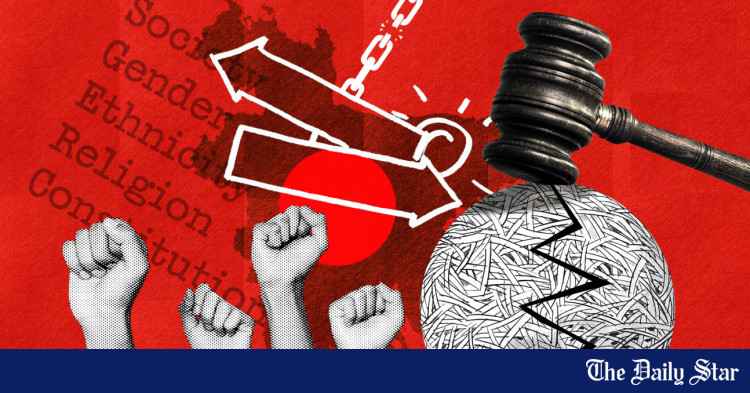HC questions 15th amendment that scrapped caretaker govt system
Staff Correspondent 19 August, 2024, 13:05

The High Court on Monday asked the government to explain in 10 days why the 15th amendment to the constitution, scrapping the caretaker government system in 2011, would not be declared illegal.
The court also asked the government to explain why all the government’s actions taken on the basis of the 15th amendment would not be declared illegal.
The court asked the secretaries of the law ministry and Jatiya Sangsad’s secretariat to explain the rule in 10 days.
The bench of Justice Naima Haider and Justice Sashanka Shekhar Sarkar issued the rule after hearing a writ petition filed on Sunday by five eminent citizens challenging the legality of the amendment made by the government of deposed prime minister Sheikh Hasina.
The citizens are Sushashoner Jonno Nagorik president M Hafizuddin Khan, its secretary Badiul Alam Majumder, local government expert Tofail Ahmed, and two individuals, Md Jobirul Hoque and Zahrah Rahman.
The court heard attorney general Md Asaduzzaman before issuing the rule.
The citizens’ lawyer, Sharif Bhuiyan, argued that the parliament scrapped the national election-time non-governmental caretaker system through the 15th amendment in violation of the Appellate Division’s May 10, 2011, short order that observed that the elections of the 10th and 11th parliaments could be held under the caretaker government system.
The lawyer argued that the caretaker government system was abolished on the recommendations of deposed prime minister Sheikh Hasina, although a 15-member special parliamentary committee and all civil citizens opined for the retention of the caretaker government system.
As the 15th amendment was unconstitutional, the incorporation of new Articles 7A and 7B into the constitution was illegal, he argued.
Article 7A. (1) says, ‘If any person, by show of force or use of force or by any other un-constitutional means-
(a) abrogates, repeals or suspends or attempts or conspires to abrogate, repeal or suspend this Constitution or any of its article ; or
(b) subverts or attempts or conspires to subvert the confidence, belief or reliance of the citizens to this Constitution or any of its article, his such act shall be sedition and such person shall be guilty of sedition.
(2) If any person,
(a) abets or instigates any act mentioned in clause (1); or (b) approves, condones, supports or ratifies such act, his such act shall also be the same offence.
(3) Any person alleged to have committed the offence mentioned in this article shall be sentenced with the highest punishment prescribed for other offences by the existing laws.
On Sunday, Supreme Court lawyer Muzahidul Islam filed a case against former chief justice ABM Khairul Haque for illegally changing the verdict on the caretaker government provision.
Staff Correspondent 19 August, 2024, 13:05
The High Court on Monday asked the government to explain in 10 days why the 15th amendment to the constitution, scrapping the caretaker government system in 2011, would not be declared illegal.
The court also asked the government to explain why all the government’s actions taken on the basis of the 15th amendment would not be declared illegal.
The court asked the secretaries of the law ministry and Jatiya Sangsad’s secretariat to explain the rule in 10 days.
The bench of Justice Naima Haider and Justice Sashanka Shekhar Sarkar issued the rule after hearing a writ petition filed on Sunday by five eminent citizens challenging the legality of the amendment made by the government of deposed prime minister Sheikh Hasina.
The citizens are Sushashoner Jonno Nagorik president M Hafizuddin Khan, its secretary Badiul Alam Majumder, local government expert Tofail Ahmed, and two individuals, Md Jobirul Hoque and Zahrah Rahman.
The court heard attorney general Md Asaduzzaman before issuing the rule.
The citizens’ lawyer, Sharif Bhuiyan, argued that the parliament scrapped the national election-time non-governmental caretaker system through the 15th amendment in violation of the Appellate Division’s May 10, 2011, short order that observed that the elections of the 10th and 11th parliaments could be held under the caretaker government system.
The lawyer argued that the caretaker government system was abolished on the recommendations of deposed prime minister Sheikh Hasina, although a 15-member special parliamentary committee and all civil citizens opined for the retention of the caretaker government system.
As the 15th amendment was unconstitutional, the incorporation of new Articles 7A and 7B into the constitution was illegal, he argued.
Article 7A. (1) says, ‘If any person, by show of force or use of force or by any other un-constitutional means-
(a) abrogates, repeals or suspends or attempts or conspires to abrogate, repeal or suspend this Constitution or any of its article ; or
(b) subverts or attempts or conspires to subvert the confidence, belief or reliance of the citizens to this Constitution or any of its article, his such act shall be sedition and such person shall be guilty of sedition.
(2) If any person,
(a) abets or instigates any act mentioned in clause (1); or (b) approves, condones, supports or ratifies such act, his such act shall also be the same offence.
(3) Any person alleged to have committed the offence mentioned in this article shall be sentenced with the highest punishment prescribed for other offences by the existing laws.
On Sunday, Supreme Court lawyer Muzahidul Islam filed a case against former chief justice ABM Khairul Haque for illegally changing the verdict on the caretaker government provision.
The lawyer in the case alleged that Khairul, in his written verdict on September 16, 2012, after his retirement, changed the original verdict, stating that the caretaker government could only be formed with elected lawmakers.
The case said that Justice Khairul, in the changed verdict, also observed that the parliament would be dissolved 42 days before the national election and a small cabinet might be formed to carry out routine work until a new cabinet assumed office.
Last edited:








